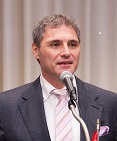CULCON and Cultivating the Next Generation Leaders in Japan and the U.S.A.
November 15, 2017
Mr. Harry A. Hill
Out-side Director and Member of the Board
New Business Development, Oak Lawn Marketing Inc.
�� Today let me share the words and themes that I cherish. Firstly, I believe in entrepreneurship, underpinned by imagination and creativity. Since I came to Japan, I have launched several businesses. I have learnt both from success and failure that good management and leadership ensure effective execution. I also believe CSR (Corporate Social Responsibility) is more than philanthropic activities and will fortify one��s corporate structure. And lastly, I support the upcoming leaders in Japan and the U.S.A. and would like to share some concrete suggestions.
Today let me share the words and themes that I cherish. Firstly, I believe in entrepreneurship, underpinned by imagination and creativity. Since I came to Japan, I have launched several businesses. I have learnt both from success and failure that good management and leadership ensure effective execution. I also believe CSR (Corporate Social Responsibility) is more than philanthropic activities and will fortify one��s corporate structure. And lastly, I support the upcoming leaders in Japan and the U.S.A. and would like to share some concrete suggestions.
��I came to Japan in 1985 as an Assistant Language Teacher appointed by the Gifu Prefectural Board of Education. I can say my imagination and creativity brought me to this country. I became fascinated by Japan after reading ��Japan as No.1�� written by Ezra F. Vogel and aspired to become an expert on Japan. In my sophomore year, I came to think ahead about my future and decided to major in Japanese language and culture with the vision to become a bridge across the Pacific. Back in 1985, I was the only foreign teacher in the whole Gifu Prefecture. But in my third year, the number jumped to 50 and in four years, there were 100 teachers. As Gifu Prefecture hosted the 1988 Future Expo, I acted as an interpreter for the Prefectural Governor. My three-and-a-half-year assignment in Japan convinced me that I would have a greater chance in this country. I was briefly back in the U.S.A. and returned to Japan in 1990 with an ambition to work for Japanese companies. Contrary to my expectations, I was not a suitable candidate for companies looking for someone with an engineering or MBA degree.
��I therefore decided to start my own business. In 1990, I founded an event services company SGI Japan, followed by H&R Consultants in 1993 which was the first real-estate and relocation services company exclusively for foreign-affiliated company employees in Nagoya. In the face of intensifying trade friction between Japan and the U.S.A. in the early 1990s, Japanese companies began establishing joint ventures to ease the tension. Also in Nagoya, joint ventures were formed with US companies including Boeing and General Dynamics, quadrupling the number of expatriates and families stationed in Nagoya. With the belief that entrepreneurs build bridges, we provide a range of services to facilitate smooth adjustment to their new life in Japan.
��In 1999, I joined Oak Lawn Marketing, Inc. and served as President and CEO from 2006 up to this September. The company runs Shop Japan, the third-largest TV teleshopping business in Japan. Its sales surged by 4.5 times in 11 years and formed a capital alliance with NTT DOCOMO Inc. in 2009. The home fitness market in the U.S.A totals 150 billion yen per year and we succeeded in creating numerous hit products in Japan that enrich our customers�� life through fitness and diet.
I also wear many different hats in civic activities, serving as Co-Chair for four groups of the Americas-Japan Relations Committee and the Japan Hands Task Force of the Japan Association of Corporate Executives as well as the CEO Forum and Education Task Force of the American Chamber of Commerce in Japan (ACCJ). I also serve as Trustee of HOPE International Development Agency Japan, an NPO dedicated to providing clean and safe water to the underprivileged in developing countries. Actually, I just returned from a fact-finding mission to a remote province in Cambodia yesterday where I witnessed how water wells can dramatically improve people��s lives and income.
��Now let me talk about the US-Japan Conference on Cultural and Educational Interchange (CULCON). In 2014, I was appointed by the White House as the Chair of CULCON, a bi-national group established in 1961 to build stronger people-to-people ties that would facilitate mutual understanding and reinforce bilateral relationships. Our greatest concern today is the decline in the pace of student mobility between the two countries in recent years. Japanese students studying in the U.S.A. peaked 13 years ago at over 40,000 but now the number has halved to below 20,000. I believe it is partly due to the waning of both the American and Japanese economies. Studying abroad is no longer a résumé-booster as Japanese companies are not that keen on recruiting students who have studied in an international environment. To cultivate young talents who serve to lay the foundations of long-term bi-lateral relationships, I have some suggestions to Japanese companies. Companies are encouraged to actively recruit students with a strong international background. Also, a longer-term internship program (6-8 weeks) will be helpful. It would be even better to send young employees overseas to study for one academic year and then conduct internship at a subsidiary in the U.S.A.
��It is disappointing that we witness a sharp decline in students interested in overseas countries. I believe we adults should inspire the younger generation to have ambitions, to take on new challenges, to have an adventurous spirit and to feel convinced that they will have a brighter future by investing in themselves. As the saying goes ��the sky is the limit,�� I will render my services to support young people maximize their potential as they envision a bright future full of opportunities.